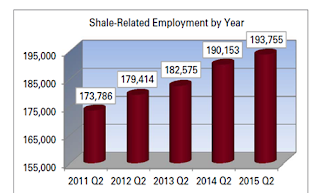Evidence continues to pour in confirming the benefits of fracking, which has been safely conducted in the United States since the mid-1900s.
Jackie Stewart of Energy In Depth Ohio reported last month about an update given in Youngstown by state officials that indicated Ohio will be producing more natural gas than it consumes, thanks to the success of fracking. Oil production doubled in Ohio last year, and natural gas production rose 110 percent.
The Daily Caller website included an article on May 3 that said cheaper energy produced via hydraulic fracking "lowered the cost of living for the average American by almost $750" annually since 2008, citing a report from the Energy Information Administration.
Writing in Capitol Weekly, Rock Zierman countered the claims of anti-fracking zealots like Sen. Bernie Sanders or actor Mark Ruffalo by citing a Washington Post editorial that chastised their "Keep It in the Ground" ideology as being "utterly unrealistic."
Pointing out that emissions actually declined in 2015, Zierman said "a fracking ban would be counterproductive to our economic, security and environmental interests."
The numbers don't lie, and neither do the positive results. Fracking is safe and is strengthening America's economy and our standing in the world.
Thursday, May 19, 2016
Wednesday, May 11, 2016
Oil & Gas Jobs, Education Programs Abound in Stark and Carroll Counties, and Throughout Ohio
A recent article by Energy In Depth highlighted good news on the oil and gas job front in the State of Ohio. EID highlighted a report from the Ohio Department of Job and Family Services showing that between 2011 and 2015 shale accounted for more 180,000 new jobs per year statewide.
With that kind of job market, the article pointed out, shale-related businesses grew by more than 40 percent during the same period. And, with shale-related jobs paying an average of $75,000 a year, compared to a $46,000 average for other industries in the state, the economic impact of shale-related job growth is readily evident.
Educational institutions have taken note in recent years. Stark State College in Canton offers specialized training for the industry through its oil and gas programs, which include associate's degrees, one-year certificates, short-term offerings, and noncredit courses. And Marlington High School in Alliance offers an oil and gas technology program through its Career Technical Education department.
Despite the downturn in the global oil and gas industry in recent years, progress continues in Ohio, as the jobs report indicates. With more skilled workers entering the workforce from local and statewide institutions, the workforce will keep up with the job market, with the net result being the strengthening of local economies through lower unemployment numbers and a higher tax base.
With that kind of job market, the article pointed out, shale-related businesses grew by more than 40 percent during the same period. And, with shale-related jobs paying an average of $75,000 a year, compared to a $46,000 average for other industries in the state, the economic impact of shale-related job growth is readily evident.
Educational institutions have taken note in recent years. Stark State College in Canton offers specialized training for the industry through its oil and gas programs, which include associate's degrees, one-year certificates, short-term offerings, and noncredit courses. And Marlington High School in Alliance offers an oil and gas technology program through its Career Technical Education department.
Despite the downturn in the global oil and gas industry in recent years, progress continues in Ohio, as the jobs report indicates. With more skilled workers entering the workforce from local and statewide institutions, the workforce will keep up with the job market, with the net result being the strengthening of local economies through lower unemployment numbers and a higher tax base.
Subscribe to:
Comments (Atom)


